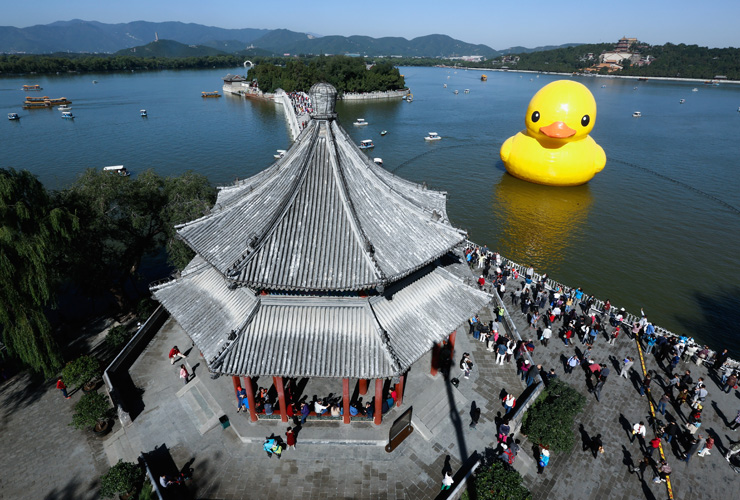Beijing sinking by four inches a year
Subsidence on massive scale threatens infrastructure of China's capital

A free daily email with the biggest news stories of the day – and the best features from TheWeek.com
You are now subscribed
Your newsletter sign-up was successful
Beijing is sinking due to the excessive pumping of groundwater, scientists have warned.
The city sits on extensive natural reservoirs of water that are drying out through human use, causing areas to subside.
The team behind the research, which used satellite imagery for its findings, say the city's central Chaoyang business district is among the worst-affected areas, subsiding at four inches a year.
The Week
Escape your echo chamber. Get the facts behind the news, plus analysis from multiple perspectives.

Sign up for The Week's Free Newsletters
From our morning news briefing to a weekly Good News Newsletter, get the best of The Week delivered directly to your inbox.
From our morning news briefing to a weekly Good News Newsletter, get the best of The Week delivered directly to your inbox.
Because different areas are sinking at different rates, the subsidence is a major threat to the city's infrastructure and poses a particular risk to its high-speed rail network.
Some 20 million people live in Beijing, says The Guardian, and they are placing an excessive demand on the city's underground water reserves. China's capital sits at the centre of an arid plain, so wells are sunk to locate water.
Many of the Beijing's tens of thousands of wells are used for farming or landscaping. The state regulates the extraction of water but enforcement is "doubtful" and "inconsistent", says leading environmentalist Ma Jun.
China started looking for an engineering solution to Beijing's water crisis some years ago, says The Guardian – and a £48bn network of canals and tunnels was completed last year.
A free daily email with the biggest news stories of the day – and the best features from TheWeek.com
Some water wells have already been phased out and a 2015 study recommended that drilling wells near high-speed rail lines should be banned.
The international team behind the study, published in the journal Remote Sensing, are now examining in detail the potential future effects of the subsidence.
They told The Guardian they expected to publish results next year, saying: "We are currently carrying out a detailed analysis of the impacts of subsidence on critical infrastructure (eg high-speed railways) in the Beijing plain."
-
 Political cartoons for February 17
Political cartoons for February 17Cartoons Tuesday’s political cartoons include a refreshing spritz of Pam, winter events, and more
-
 Alexei Navalny and Russia’s history of poisonings
Alexei Navalny and Russia’s history of poisoningsThe Explainer ‘Precise’ and ‘deniable’, the Kremlin’s use of poison to silence critics has become a ’geopolitical signature flourish’
-
 Are Hollywood ‘showmances’ losing their shine?
Are Hollywood ‘showmances’ losing their shine?In The Spotlight Teasing real-life romance between movie leads is an old Tinseltown publicity trick but modern audiences may have had enough
-
 Epstein files topple law CEO, roil UK government
Epstein files topple law CEO, roil UK governmentSpeed Read Peter Mandelson, Britain’s former ambassador to the US, is caught up in the scandal
-
 Iran and US prepare to meet after skirmishes
Iran and US prepare to meet after skirmishesSpeed Read The incident comes amid heightened tensions in the Middle East
-
 Israel retrieves final hostage’s body from Gaza
Israel retrieves final hostage’s body from GazaSpeed Read The 24-year-old police officer was killed during the initial Hamas attack
-
 China’s Xi targets top general in growing purge
China’s Xi targets top general in growing purgeSpeed Read Zhang Youxia is being investigated over ‘grave violations’ of the law
-
 Panama and Canada are negotiating over a crucial copper mine
Panama and Canada are negotiating over a crucial copper mineIn the Spotlight Panama is set to make a final decision on the mine this summer
-
 Why Greenland’s natural resources are nearly impossible to mine
Why Greenland’s natural resources are nearly impossible to mineThe Explainer The country’s natural landscape makes the task extremely difficult
-
 Iran cuts internet as protests escalate
Iran cuts internet as protests escalateSpeed Reada Government buildings across the country have been set on fire
-
 US nabs ‘shadow’ tanker claimed by Russia
US nabs ‘shadow’ tanker claimed by RussiaSpeed Read The ship was one of two vessels seized by the US military